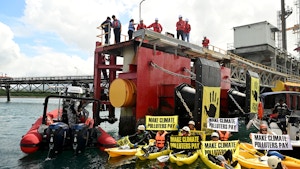Asia Pacific‘s leading platform for sustainable development
#oil News

Its industry would benefit from a plan to cut emissions, which the UN shipping regulator is due to finalise this year.

Energy
Analysis: Coal power drops in China and India for first time in 52 years after clean-energy records
Coal power generation fell in both China and India in 2025, the first simultaneous drop in half a century, after each nation added record amounts of clean energy.

Despite pushback, Global South delegates achieved consensus on a number of issues and an increased budget for the UN Environment Programme.

Policy & Finance
What’s next for US climate policy under Trump?
As President Donald Trump heads into the second year of his second term, climate scientists worry about his anti-climate posture.
#oil Opinion

Carbon & Climate
From Rio to Belém: The long unravelling of climate consensus
Three decades after the optimism of the 1992 Earth Summit, the climate regime faces a tough test. The retreat of multilateralism and the rules-based international order has left COP30 struggling to hold together the fading promise of global action.

The world is not on track to meet its climate targets, and the devastating effects of global warming are appearing faster than many anticipated. But the undeniable progress made in the Paris climate agreement's first decade provides reason to hope that more progress can be made.

The rapid uptake of alternative fuels in shipping is outpacing international liability regimes – leaving gaps in protection against spills and accidents.

Carbon & Climate
Why the climate crisis must reshape how we think about war
As global temperatures breach 1.5°C – and conflicts persist in Ukraine, Gaza and Sudan – the climate crisis is reshaping how wars are fought, understood and responded to.
Policy & Finance
Fossil fuel adverts are today’s tobacco. Cities must ban them
Policy & Finance
Trump’s second term is not the end of ESG, but a crossroads moment
#oil Videos

Carbon & Climate
Greenpeace activists block Shell facility in Philippine port to demand climate reparations
The action comes despite the oil giant suing the environmental group for US$2.1 million after demonstrators boarded the company’s vessel at the Atlantic Ocean in January.

Policy & Finance
‘No income, insufficient aid’ for Oriental Mindoro fisherfolk after oil spill: Research group
A coalition of scientists and environmentalists found “widespread economic impacts” for communities in the Philippine province, heightening calls for accountability from the sunken tanker reportedly chartered by a San Miguel Corp subsidiary.

In the video, environmental law group ClientEarth compares the oil and gas giant's advertisements on its low-carbon investments to a burger chain claiming that they’re vegan because they’ve got salad on the menu.

DONG Energy’s shift to 100 per cent renewable energy marks another important step in the global transition away from fossil fuels.
#oil Podcasts

Energy
Scrutiny, Scope 3 and Asian realities: Petronas sustainability chief on climate action at COP28
The oil and gas sector needs to cut operational emissions faster, Charlotte Wolff-Bye tells the Eco-Business podcast. But slashing fuel output won’t do for the Asian supplier, and it welcomes respectful debate at the climate summit.

Eco-Business talks to Peter Kiernan, lead energy analyst for the Economist Intelligence Unit, to unpack a new landmark report from the International Energy Agency, which proposes an immediate ban on fossil fuels extraction to curb global warming.

The Philippines has ended new coal development as it pursues a low-carbon future. Don Paulino of non-profit Philippine Energy Independence Council and boss of Shell's exploration arm, argues why natural gas should remain in the energy mix.

The waste oil dumped into the ocean by ships every year is equivalent to eight Exxon Valdez oil spills, and nowhere is the problem as severe as Southeast Asia. The EB Podcast talks to hotelier Andrew Dixon about how a clever idea using a ship tracking system can help curb an environmental crime that has been largely ignored.
#oil Press Releases

UN Environment Programme (UNEP)
Better data driving action on methane emissions, but more work needed

UN Environment Programme
Global annual finance flows of US$7 trillion fueling climate, biodiversity, land degradation crises








